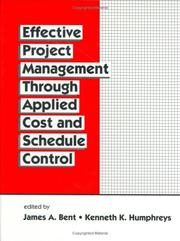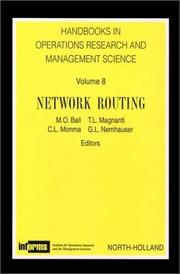| Listing 1 - 10 of 18 | << page >> |
Sort by
|
Book
ISBN: 222585193X 9782225851933 Year: 1996 Publisher: Paris : Masson,
Abstract | Keywords | Export | Availability | Bookmark
 Loading...
Loading...Choose an application
- Reference Manager
- EndNote
- RefWorks (Direct export to RefWorks)
Book
Year: 1968 Publisher: Paris : Dunod,
Abstract | Keywords | Export | Availability | Bookmark
 Loading...
Loading...Choose an application
- Reference Manager
- EndNote
- RefWorks (Direct export to RefWorks)
Periodical
Abstract | Keywords | Export | Availability | Bookmark
 Loading...
Loading...Choose an application
- Reference Manager
- EndNote
- RefWorks (Direct export to RefWorks)
Emploi du temps --- Ordonnancement (Gestion) --- Production scheduling --- Scheduling --- Job scheduling (Production control) --- Job-shop scheduling --- Project scheduling (Production control) --- Scheduling (Management) --- Production scheduling. --- Scheduling. --- Time management --- Production control
Book
ISBN: 9061964571 Year: 1995 Volume: 113 Publisher: Amsterdam : Centrum voor Wiskunde en Informatica,
Abstract | Keywords | Export | Availability | Bookmark
 Loading...
Loading...Choose an application
- Reference Manager
- EndNote
- RefWorks (Direct export to RefWorks)
Queuing theory --- Production scheduling --- Markov processes --- Dynamic programming --- Files d'attente, Théorie des --- Ordonnancement (Gestion) --- Markov, Processus de --- Programmation dynamique

ISBN: 0824797159 Year: 1996 Volume: 26 Publisher: New York : M. Dekker,
Abstract | Keywords | Export | Availability | Bookmark
 Loading...
Loading...Choose an application
- Reference Manager
- EndNote
- RefWorks (Direct export to RefWorks)
Engineering economy. --- Project management. --- Cost control. --- Production scheduling. --- Décision économique, prise de --- Gestion de projet --- Prix de revient --- Ordonnancement (Gestion) --- Contrôle
Book
ISBN: 9782717866179 2717866175 Year: 2013 Publisher: Paris : Economica,
Abstract | Keywords | Export | Availability | Bookmark
 Loading...
Loading...Choose an application
- Reference Manager
- EndNote
- RefWorks (Direct export to RefWorks)
Inventory control --- Business logistics --- Production control --- Gestion des stocks --- Logistique (Organisation) --- Production --- Contrôle --- Logistique (organisation) --- Gestion de l'approvisionnement --- Gestion --- Contrôle --- Qualité --- Juste-à-temps (Système) --- Planification stratégique --- Ordonnancement (Gestion) --- Informatique --- Logistique (gestion) --- Logistique (Organisation) - Manuels d'enseignement supérieur --- Production - Gestion - Manuels d'enseignement supérieur --- Qualité - Contrôle --- Production - Gestion - Informatique
Multi
ISBN: 9782370323712 Year: 2022 Publisher: [Bayonne] : Institut francophone pour la justice et la démocratie,
Abstract | Keywords | Export | Availability | Bookmark
 Loading...
Loading...Choose an application
- Reference Manager
- EndNote
- RefWorks (Direct export to RefWorks)
La pensée juridique américaine contemporaine comprend très largement le droit au travers de sa relation à la société. Le droit est un outil d’ordonnancement des rapports sociaux (social ordering), destiné à réaliser les aspirations de la communauté politique. Ces travaux portent sur les origines de cette perspective et sur la contribution majeure de la tradition doctrinale du legal process. Ils éclairent, en premier lieu, l’apport de cette dernière à la construction, par couches successives, de la manière de penser en juriste aux États-Unis. Au-delà de l’apparente discontinuité de la pensée juridique américaine, nos conclusions suggèrent que le XXe siècle est traversé par un projet doctrinal commun, marqué par la synthèse du libéralisme et du développement de l’action de l’État. L’angle d’étude choisi pour rendre compte de ces évolutions est la distinction public-privé. Cette analyse est ainsi consacrée à l’évolution de la conception doctrinale de l’État, comprise à l’aide de l’examen de la définition du droit et des rapports évolutifs entre le droit privé et le droit public. Nos conclusions éclairent donc, dans un second temps, le passage du gouvernement à la gouvernance et le dépassement des enjeux traditionnels de la distinction public-privé. Ces éléments expliquent pourquoi la pensée juridique actuelle, influencée entre autres par le legal process, tend à définir la frontière entre l’action publique et la sphère privée de manière pragmatique, pour répondre efficacement aux objectifs sociaux.
Doctrine juridique --- Droit --- Droit public et droit privé --- Gouvernance --- Aspect social --- Pensée juridique --- Ordonnancement social --- Public/privé --- Etat --- Legal process --- Réalisme --- Formalisme --- Etats-Unis --- Droit public et droit privé --- Procédure (droit) --- Law --- Judicial process --- Processus judiciaire --- Philosophy --- Philosophie --- Sociologie juridique
Book
ISBN: 9782804183851 Year: 2014 Volume: *41 Publisher: Bruxelles : De Boeck,
Abstract | Keywords | Export | Availability | Bookmark
 Loading...
Loading...Choose an application
- Reference Manager
- EndNote
- RefWorks (Direct export to RefWorks)
Adaptieve regelsystemen --- Adaptive control systems --- Ateliers flexibles --- Cellular manufacturing --- Cellules de fabrication --- Cellules flexibles de fabrication --- Commande adaptative [Systèmes à ] --- FMS (Production engineering) --- Fabrication [Systèmes flexibles de ] --- Flexibele fabricagemethoden --- Flexibilité des systèmes de fabrication --- Flexibilité des systèmes de production --- Flexible manufacturing systems --- Flexible production systems --- Job scheduling (Production control) --- Job-shop scheduling --- Manufacturing cells --- Manufacturing systems [Flexible ] --- New products --- Nieuwe produkten --- Ordonnancement (Gestion) --- Ordonnancement de la production --- Ordonnantie (Beheer) --- Productie--Beheer --- Productiecellen --- Production -- Ordonnancement --- Production [Systèmes flexibles de ] --- Production management --- Production scheduling --- Production systems [Flexible ] --- Production--Gestion --- Produits nouveaux --- Project scheduling (Production control) --- Scheduling (Management) --- Scheduling of operations --- Scientific programming --- Self-adaptive control systems --- Systèmes adaptatifs --- Systèmes auto-adaptatifs --- Systèmes autoadaptatifs --- Systèmes de fabrication flexibles --- Systèmes de production flexibles --- Systèmes flexibles de fabrication --- Systèmes flexibles de production --- Systèmes à commande adaptative --- Îlots flexibles de fabrication --- Industrial management --- Organizational change --- Gestion d'entreprise --- Changement organisationnel --- Production --- Fabrication, Systèmes flexibles de --- Procédés de fabrication --- Gestion --- Automatisation --- Manufacturing processes --- Automation --- Fabrication, Systèmes flexibles de. --- Systèmes adaptatifs. --- Gestion. --- Automatisation.
Book
ISBN: 9781439805954 1439805954 9781439805961 9781439888186 Year: 2010 Publisher: Boca Raton, Fla CRC
Abstract | Keywords | Export | Availability | Bookmark
 Loading...
Loading...Choose an application
- Reference Manager
- EndNote
- RefWorks (Direct export to RefWorks)
In the decade since the publication of Rajan Suri's landmark book, Quick Response Manufacturing, the innovative principles of QRM have been proven with impressive results at many companies, big and small, in a variety of industries. While the key principles of QRM remain unchanged, after a decade of teaching QRM workshops to senior executives, Suri has developed a clear, concise, and accessible method of presenting QRM strategy using four core concepts: 1. The Power of Time - the huge impact time has on your entire enterprise 2. Organization Structure - how to structure your organization to reduce lead times 3. System Dynamics - understanding how interactions between jobs and resources impact time to make better decisions on capacity, lot sizes, and similar issues 4. Enterprise-Wide Application - QRM is not just a shop floor strategy, it extends across your whole enterprise including material planning and control, supply management, office operations, and new product introduction Presenting new case studies on QRM implementation, It's About Time: The Competitive Advantage of Quick Response Manufacturing illustrates how QRM can not only reduce lead times but also improve quality, reduce operating costs, and enable companies to gain substantial market share. This practical reference explains how factories in advanced nations can use QRM strategy to compete with manufacturers in low-wage countries. In addition, it provides helpful pointers for QRM implementation, including accounting strategies, novel cost-justification approaches, and a stepwise process for implementation. Also included is a bonus CD with five appendices that provide a number of practical details to assist in the success of your QRM implementation. When you are ready to start implementing QRM, you will find that these appendices contain time-saving tips to help you work through implementation issues-including simple calculation methods and tools to support the design of your QRM strategy.
Production management --- magazijnen --- warehouses --- productbeleid --- Production scheduling --- Manufacturing cells --- New products --- Production --- Ordonnancement (Gestion) --- Cellules de fabrication --- Produits nouveaux --- Gestion --- Production management. --- Production scheduling. --- Manufacturing cells. --- New products. --- #SBIB:316.334.2A551 --- #SBIB:316.334.2A552 --- New product development --- NPD (Marketing) --- Product development --- Products, New --- Commercial products --- Industrial design --- Cellular manufacturing --- Manufacturing processes --- Job scheduling (Production control) --- Job-shop scheduling --- Project scheduling (Production control) --- Scheduling (Management) --- Production control --- Scheduling --- Manufacturing management --- Industrial management --- Partijen en strategieën in de onderneming: ondernemingsbeleid en management --- Partijen en strategieën in de onderneming: scientific management, tijds- een bewegingsstudies, beoordelingstechnieken, Taylorisme, kwaliteitsmanagement

ISBN: 0444821414 9780444821416 0444821411 Year: 1995 Volume: 8 Publisher: Elsevier
Abstract | Keywords | Export | Availability | Bookmark
 Loading...
Loading...Choose an application
- Reference Manager
- EndNote
- RefWorks (Direct export to RefWorks)
Planning (firm) --- Computer architecture. Operating systems --- Operational research. Game theory --- Network analysis (Planning) --- Production scheduling. --- Analyse de réseau (Planification) --- Ordonnancement (Gestion) --- Network analysis (planning) --- 519.8 --- Production scheduling --- 658.012 --- 681.35 --- 518.5 --- Job scheduling (Production control) --- Job-shop scheduling --- Project scheduling (Production control) --- Scheduling (Management) --- Production control --- Scheduling --- Project networks --- Planning --- Operational research --- Planning in het bedrijf --- Computerarchitectuur. Operating systems --- Operationeel onderzoek. Speltheorie --- Network analysis (Planning). --- 519.8 Operational research --- Analyse de réseau (Planification) --- ELSEVIER-B EPUB-LIV-FT --- System analysis
| Listing 1 - 10 of 18 | << page >> |
Sort by
|

 Search
Search Feedback
Feedback About UniCat
About UniCat  Help
Help News
News